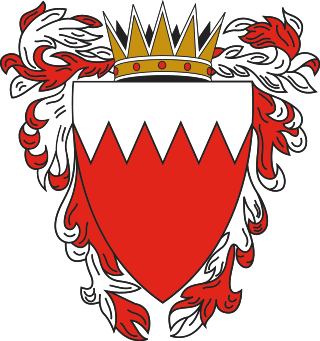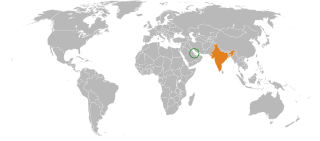
Manama is the capital and largest city of Bahrain, with an approximate population of 200,000 as of 2020. Long an important trading center in the Persian Gulf, Manama is home to a very diverse population. After periods of Portuguese and Persian control and a short invasion from the ruling dynasty of Saudi Arabia, followed by a longer invasion by Oman, Bahrain established itself as an independent nation in 1971 following a period of British hegemony.

Bahrain plays a modest, moderating role in regional politics and adheres to the views of the Arab League on Middle East peace and Palestinian rights. Since achieving independence in 1971, Bahrain has maintained friendly relations with most of its neighbours and with the world community. It generally pursues a policy of close consultation with neighbouring states and works to narrow areas of disagreement.

Hamad bin Isa bin Salman Al Khalifa is King of Bahrain since 14 February 2002, after ruling as Emir of Bahrain from 6 March 1999. He is the son of Isa bin Salman Al Khalifa, the previous and first emir. The country has been ruled by the Al Khalifa dynasty since 1783.

Khalifa bin Salman Al Khalifa was a Bahraini royal and politician who served as the Prime Minister of Bahrain from 10 January 1970 until his death in 2020. He took office over a year before Bahrain's independence on 15 August 1971. He was the longest-serving prime minister in the world. Under the 2002 Constitution he lost some of his powers, with the King now having the authority to appoint and dismiss ministers.

The Qatar Bahrain Causeway was a planned causeway between the two Arab states of Qatar and Bahrain. It was also expected that a ferry service would be established between the two countries in 2017.

Khalid bin Ahmed Al Khalifa is a Bahraini diplomat who served as Bahrain's Minister of Foreign Affairs from 2005 until January 2020. Khalid became only the second foreign minister in Bahrain's history after replacing Mohammed bin Mubarak Al Khalifa who then became Bahrain's deputy prime minister.

Javed Malik is a diplomat, noted media personality and the President of the Diplomat Business Club based in London and Dubai. Malik served as Pakistan's Ambassador to the Kingdom of Bahrain between 2015 and 2018, and the Prime Minister's Special Envoy for Trade and Investment between 2013 and 2018. Earlier, Malik also served as Pakistan's Ambassador at Large for Overseas Pakistanis between 2008 and 2011. Currently he is the President of International Diplomat Forum based out of London, Dubai and Islamabad.

Bahrain, officially the Kingdom of Bahrain, is an island country in West Asia. It is situated on the Persian Gulf, and comprises a small archipelago made up of 50 natural islands and an additional 33 artificial islands, centered on Bahrain Island which makes up around 83 percent of the country's landmass. Bahrain is situated between Qatar and the northeastern coast of Saudi Arabia, to which it is connected by the King Fahd Causeway. The population of Bahrain is 1,501,635 as of May 14, 2023, based on elaborations of the United Nations data, of whom 712,362 are Bahraini nationals. Bahrain spans some 760 square kilometres (290 sq mi), and is the third-smallest nation in Asia after the Maldives and Singapore. The capital and largest city is Manama.

Extremely strong and cordial relations exist between Bahrain and Pakistan. Bahrain maintains an embassy in Islamabad and a Consulate-General in Karachi, whilst Pakistan maintains an embassy in Manama. Both countries are members of the OIC and of the G 77.

Foreign relations exist between Bahrain and Turkey. Turkey's historic relationship with Bahrain has wavered between indifference and courtship, but the constant has been a layer of mistrust emanating from both ends that appears to have been set aside in 2002 when the new Turkish government reversed the status quo and embraced a policy of engagement that has successfully catapulted the country to becoming a leading economic player in the Bahrain.

Political, socio-economic, military and cultural ties exist between India and Bahrain. India is a close ally of Bahrain. As per Indian officials, the Kingdom along with its GCC partners are amongst the world's most prominent supporters of India's candidacy for a permanent seat on the UN Security Council, and Bahraini officials have urged India to play a greater role in international affairs. For instance, over concerns about Iran's nuclear programme, Bahrain's Crown Prince requested India to play an active role in resolving the crisis.

Relations have existed between Bahrain and Israel since Bahrain achieved its independence in 1971. In recent years, relations between the two countries have been thawing, and the countries agreed to establish diplomatic relations in September 2020. The foreign minister of Bahrain Khalid bin Ahmed Al Khalifa has been quoted saying "Israel is part of the heritage of this whole region, historically. So, the Jewish people have a place amongst us." The common threat of Iran has provided common ground for a thaw in what were once tense relations. Bahrain's foreign policy traditionally supports the creation of an independent Palestinian state.

The 2011Bahraini uprising was a series of anti-government protests in Bahrain led by the Shia-dominant and some Sunni minority Bahraini opposition from 2011 until 2014. The protests were inspired by the unrest of the 2011 Arab Spring and protests in Tunisia and Egypt and escalated to daily clashes after the Bahraini government repressed the revolt with the support of the Gulf Cooperation Council and Peninsula Shield Force. The Bahraini protests were a series of demonstrations, amounting to a sustained campaign of non-violent civil disobedience and some violent resistance in the Persian Gulf country of Bahrain. As part of the revolutionary wave of protests in the Middle East and North Africa following the self-immolation of Mohamed Bouazizi in Tunisia, the Bahraini protests were initially aimed at achieving greater political freedom and equality for the 70% Shia population.
The international reactions to the 2011 Bahraini uprising include responses by supranational organisations, non-governmental organisations, media organisations, and both the governments and civil populaces, like of fellow sovereign states to the protests and uprising in Bahrain during the Arab Spring. The small island nation's territorial position in the Persian Gulf not only makes it a key contending regional power but also determines its geostrategic position as a buffer between the Arab World and Iran. Hence, the geostrategic implications aid in explaining international responses to the uprising in Bahrain. Accordingly, as a proxy state between Saudi Arabia and Iran, Bahrain's domestic politics is both wittingly and unavoidably shaped by regional forces and variables that determine the country's response to internal and external pressures.

Abdullatif bin Rashid Al Zayani is a Bahraini engineer and retired lieutenant general. He is the foreign minister, having formerly been the secretary general of the Gulf Cooperation Council (GCC) from 1 April 2011 to February 2020. He was the fifth GCC secretary general and the first with military background since the GCC was established.

Foreign relations exist between Bahrain and Malaysia. Bahrain has an embassy in Kuala Lumpur, and Malaysia has an embassy in Manama. Malaysia also are the strong supporters to the Bahrain national dialogue during the 2011 civil unrest and willing to send a peacekeeping forces to help the country. Both countries are members of Organisation of Islamic Cooperation.

The Embassy of Pakistan, Kingdom of Bahrain is the diplomatic mission of Pakistan to the Kingdom of Bahrain. The embassy is located in the Diplomatic Area in Manama and as of April 2021 was headed by Ambassador Muhammad Ayub.

The Saudi–led intervention in Bahrain began on 14 March 2011 to assist the Bahraini government in suppressing an anti-government uprising in the country. The intervention came three weeks after the U.S. pressured Bahrain to withdraw its military forces from the streets. As a decision by Gulf Cooperation Council (GCC), the intervention included sending 1,000 (1,200) troops with vehicles from Saudi Arabia at the invitation of the Al-Khalifa ruling family, marking the first time the GCC used such a collective military option for suppressing a revolt.

The Bahrain–Israel normalization agreement, officially Abraham Accords: Declaration of Peace, Cooperation, and Constructive Diplomatic and Friendly Relations, is an agreement to normalize diplomatic and other relations between Bahrain and Israel. The agreement was announced by President Donald Trump on September 11, 2020, and followed on from a joint statement, officially referred to as the Abraham Accords, by the United States, Israel and the United Arab Emirates (UAE) on August 13, 2020. It was formally signed on September 15, 2020, at the White House in Washington, D.C., and made Bahrain the fourth Arab state to recognize Israel and the second within a month.

The kingdoms of Bahrain and Thailand share bilateral relations, established diplomatically in 1972. Thailand has an embassy in Manama and Bahrain has an embassy in Bangkok.






















